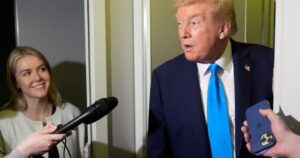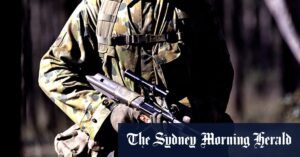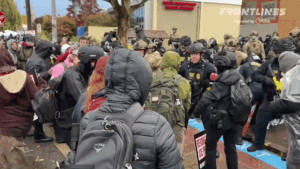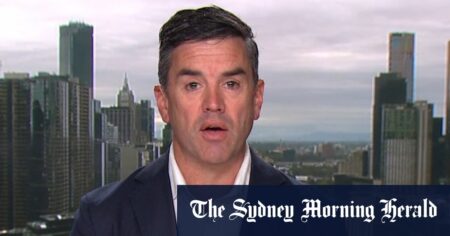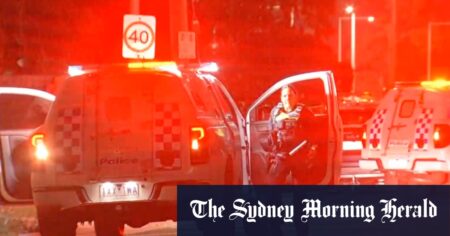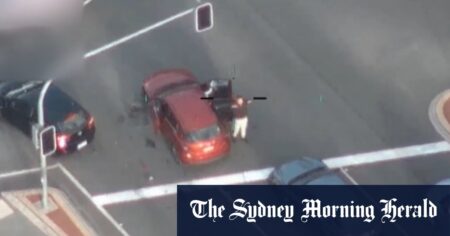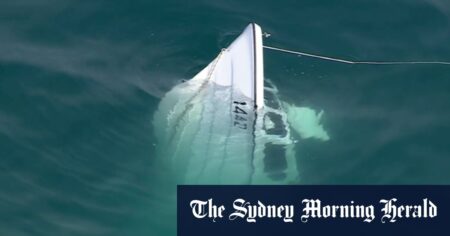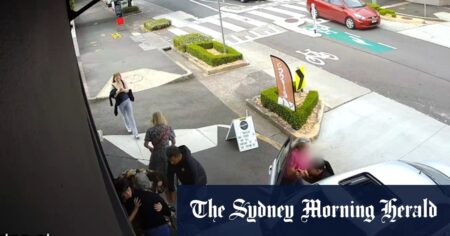TB: Yes. What I try to do with these interviews is really drill down, move beyond the usual anecdotes that you get when people have been interviewed before, and try to really find out who my subject was. And so this is what I’ve discovered is really the defining characteristic in him, which is that he had a difficulty in how he related to people: ministers, public servants, staff. He was, in many ways, a “crazy brave” political leader, who wanted to “crash through or crash” as he called it.
Fitz: Well, in the end, he did both. You have minutely detailed the crash, the Dismissal. Were you outraged by what you found?
Gough Whitlam addresses a Labor rally outside Parliament House in 1975.Credit: Michael Rayner
TB: Less outraged than shocked. This is the most dramatic, convulsive moment in our political history, and it’s a train wreck – for the individuals and institutions that were involved. And there are no heroes in this story. Malcolm Fraser pushed the system to the brink. He smashed precedents. He shattered conventions. He was naked in his pursuit of power. John Kerr was deceptive. He said he approached the prime minister by “stealth”. He didn’t convey how he really felt and did not warn Whitlam. He compromised the High Court by consulting chief justice Garfield Barwick about his powers and, secretly, with Anthony Mason (a judge on the court).
Fitz: You’ll be interested to hear that, 35 years ago, when I told Gough that, for fun, and if he’d come, I’d love to arrange lunch with him and Sir Garfield, he replied, breathily, “Well, that would be all right, comrade, but you’re going to need a very, very long table.”
TB: [Laughs] That’s Gough!
Fitz: You also make clear that it was not as if Gough had not received plenty of warning of what was to come.
TB: Yes. It’s astonishing, Peter, to sit in the National Archives and read memo after memo sent to Gough in September, October, November 1975, where they say to him, “There is a risk here of dismissal.” “Don’t treat John Kerr with contempt.” “Don’t call him ‘my viceroy’.” “Have a contingency plan.” “Think about how this crisis may be resolved.” Gough didn’t listen to the public service. He didn’t listen to his staff. He didn’t listen to his colleagues. Treasurer Bill Hayden saw John Kerr on November 6, 1975, and his copper’s instinct told him something was wrong. He went to Whitlam and said, “I’m worried … Kerr’s thinking about sacking us.” And Whitlam looked at Hayden and said, “He wouldn’t have the guts.”
Fitz: One of the stunning quotes you have in the book comes from Paul Keating, who said that if he’d been in the same situation as Gough, “I would have arrested Kerr. I would have said: ‘You are abusing a kingly power that was never yours to abuse. So therefore you’re seeking to illegally dismiss the government of Australia, which I regard as a criminal act, and I’m ordering the police to arrest you.’” Wow!
TB: Keating was not joking. He was deadly serious.
Fitz: And yet, despite the drama of the day, I love the fact that you’ve gone into the fact that Norman Gunston himself – aka the brilliant satirist, Garry McDonald – stands beside Gough on the steps, with no security anywhere, flashes the V for Victory sign, and asks if the fact that “‘Mr Frazier’ is now caretaker prime minister means he will also be responsible for mowing the Parliament House lawns?” Gold!
TB: The crowd laughs. They enjoy the joke. Garry told me that is something that speaks to the Australian character, our sense of humour, that at this moment of such great drama, we can allow ourselves to poke fun at it, to see a lighter side.
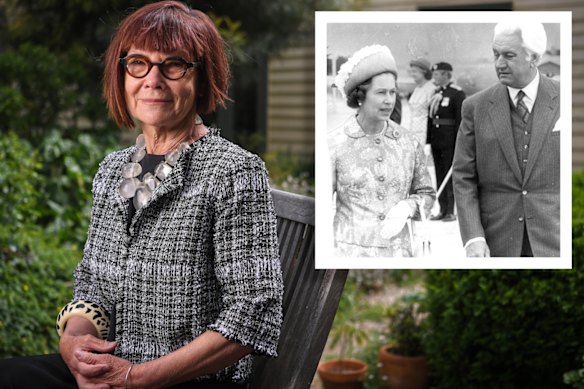
Jenny Hocking fought for the release of correspondence between Queen Elizabeth and governor-general John Kerr (pictured inset) about the Dismissal. Credit: Fairfax
Fitz: I also note you disagree with Professor Jenny Hocking’s contention in her own great book The Palace Letters that the Queen was complicit in the Dismissal because – Hocking asserts – she knew what Kerr was going to do but didn’t stop it.
TB: Yes, I do disagree. I don’t think there’s any evidence in the letters that the Queen or her staff encouraged the Dismissal, knew about his actual decision to dismiss the government in advance, or gave it a green light. It’s also the view of leading scholars like Anne Twomey and George Williams. It’s also the view of Keating, Hayden and Doug McClelland. And having talked to Buckingham Palace and 10 Downing Street staff, I am convinced that the Queen would not have had any involvement. It is not how she operated: liquidating prime ministers in her realms. There is no motive either.
Fitz: But Hocking cites the letter from the Queen’s private secretary Sir Martin Charteris to Kerr dated October 2, 1975, as pivotal in revealing the British monarchy’s prior knowledge of Kerr’s plans. She contends it shows that Kerr confided to Prince Charles that he was “considering having to dismiss the government” and that Charles relayed this to the Queen and Charteris. She describes this as “collusion and deception” and maintains it reveals a deliberate palace role in undermining Australian democracy.
Loading
TB: I disagree, Peter. Charteris replied that if Whitlam had Kerr recalled, then the Queen would follow her prime minister’s advice. She would take Whitlam’s side. On November 4, Charteris gave three warnings to Kerr: that the reserve powers should only be used when there is no other option; the crisis was “political” not “constitutional”; and only use the powers in “the last resort” and not for “political reasons”. That’s hardly encouragement.
Fitz: Can we agree, at least, that it was OUTRAGEOUS for Prince Charles to, afterwards, commend Kerr for what he did?
TB: Yes, I was the person who discovered that letter in the archives. It is completely outrageous, and it breaches royal protocol. When I interviewed Sir William Heseltine, later the Queen’s private secretary, he said that Charles’ letter was sent without the Queen’s knowledge or approval. Charles risked the impartiality and standing of the monarchy in this country. It was the wrong thing to do, and he should be condemned for it.
Fitz: I condemn. You’ve done biographies of four Australian prime ministers. And you’re up there with David Day as a prime ministerial authority across the span of our history. Would Gough take pride of place on your own Mount Rushmore of great Australian prime ministers?
TB: No, I’d probably put John Curtin at the top. [Fitz, interrupting: Hooray! Go on.] We’ve never had a prime minister who’s more popular than Curtin. Geoffrey Blainey told me that when Curtin was leaving his Melbourne hotel during WWII, people would stop in the street and clap because he had touched something in the hearts of Australians. We’ve never had [another] prime minister like that. He stood up to Winston Churchill. He stood up to Franklin Roosevelt. He did lead the country at its most perilous moment, and he paid the ultimate sacrifice.
Fitz: Who’s next to Curtin on our Rushmore, for you?
TB: You would have to put Bob Hawke up there, because the Hawke government really did transform the country economically, socially, environmentally, and he was also hugely popular and won four elections. And you’d have to pay respect to John Howard because he is the second-longest serving prime minister. He also won four elections, so he seemed to get something right as well.
Fitz: Where’s Gough?
TB: He was a very significant prime minister. He did change the nation. But he didn’t run a government very well. Ministers were tainted with scandal. Economic management and budget management were disastrous. And those lessons were learnt by his successors.

Anthony Albanese launched the Bramston book. Credit: Steven Siewert
Fitz: Among whom, you have the incumbent PM to launch your book. Albo’s obviously read it cover to cover before launching. Are there lessons for him in this account of Gough, in what to do and what not to do?
TB: He’s already learnt the biggest lesson of all, which is to keep your party united, run a cabinet efficiently and effectively, listen to public service advice and pace your reform program. But there’s another lesson he probably could learn, which is to be a little bit bolder. We are a great country, but we still have a lot of problems that need solving. And so a little bit of courage every now and then can be rewarded and respected by voters.
Gough Whitlam: The Vista of the New by Troy Bramston, Harper-Collins is available in bookstores from October 28
Read the full article here

